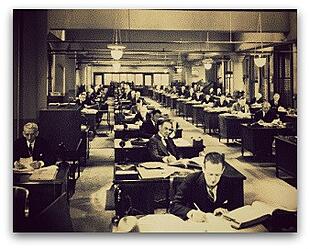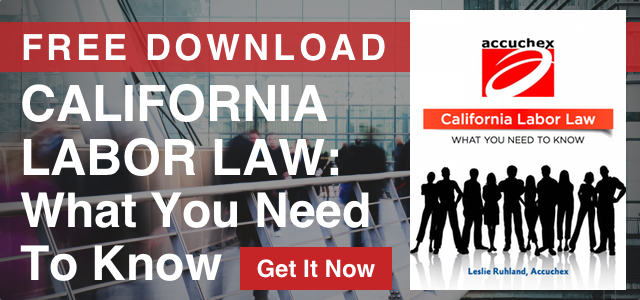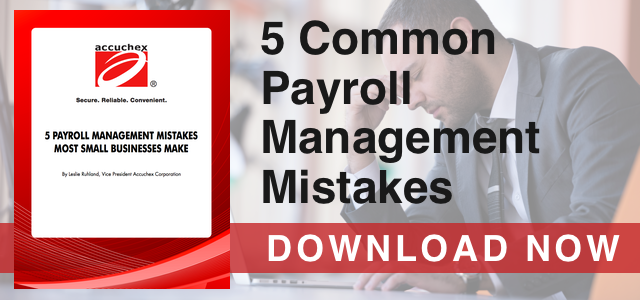 When it comes to California labor laws, breaks for meals and rest are still a source of contention. For California employers, meal and rest break compliance is the cause of a great deal of litigation. Consequently, it is extremely important to understand California's meal and rest breaks requirements.
When it comes to California labor laws, breaks for meals and rest are still a source of contention. For California employers, meal and rest break compliance is the cause of a great deal of litigation. Consequently, it is extremely important to understand California's meal and rest breaks requirements.
California Labor Laws, Breaks, and California Employers
In order to ensure compliance with these rules, it is critical for employers to communicate the legal requirements of California's employee break laws to their nonexempt workers. In addition, employers must provide opportunities for these workers to take the meal and rest breaks they are entitled to.
What the Brinker Meal and Rest Case Decided
In 2012, as a result of Brinker Restaurant Corp. v. Superior Court, the California Supreme Court made a significant decision regarding meal and rest break requirements. At issue was the question of whether employers must ensure breaks are taken, or if they must simply provide breaks. Historically, this issue has been a source of litigation in federal and state courts.
In Brinker Restaurant Corp. v. Superior Court the California Supreme Court ruled in favor of Brinker, deciding that employers do not have to ensure employees take their meal breaks. This point was the most critical part of the court’s decision. In other words, after providing the break period, employers are not obligated to monitor meal breaks to make sure the employees are not working during that time.
While this unanimous ruling favored California employers, there are still potential issues. For example, employers without written or with vague policies may subject themselves to liability. In fact, employers who are uncertain about the compliance of their meal and rest break practices should consult their HR partner or legal counsel.
Meal Break Obligations for California Employers
Employees cannot work for a period of more than five hours without being provided an unpaid, off-duty meal period of at least 30 minutes. The first meal period must be provided no later than the end of the employee's fifth hour of work.
The employer satisfies its legal obligation to provide an off duty meal period to its employees if it:
- Relieves its employees of all duty.
- Relinquishes control over their activities.
- Permits them a reasonable opportunity to take an uninterrupted, 30-minute break.
- Does not impede or discourage them from doing so.
A meal break can be unpaid only if all of the above conditions are met.
When a work period of not more than six hours will complete the day's work, the meal period may be waived by mutual consent of the employer and the employee.
Second 30-Minute Meal Break
Employers must provide a second meal break of no fewer than 30 minutes for all workdays on which an employee works more than 10 hours. The second meal break must be provided no later than the end of an employee's 10th hour of work.
An employee can waive the second meal period only if all of the following conditions are met:
- The total hours worked on that workday are not more than 12.
- You and the employee mutually consent.
- The first meal break of the workday was not waived.
On-Duty Meal Breaks
Employees can take on-duty meal periods only in certain limited circumstances. An on-duty meal break must meet all of the following conditions:
- Is permitted only when the nature of the work prevents an employee from being relieved of all duty.
- Must be agreed to in writing by you and the employee.
- Must be paid.
- Can be revoked at any time in writing by the employee, except under Wage Order 14 (Agricultural Occupations).
Generally speaking, authorizing on-duty meal breaks should only be done with caution. As a rule, employers should consult with legal counsel before authorizing on-duty meal breaks. In past court cases, on-duty meal periods have been upheld only in very limited circumstances.
10-Minute Rest Break Obligations
Employers must authorize and permit rest periods for all nonexempt employees whose total daily work time is at least 3.5 hours. These mandatory rest breaks must be offered at the rate of 10 minutes for every four hours worked, or "major fraction" thereof. Anything over two hours is considered by the courts to be a "major fraction" of four.
As a general rule, and insofar as practicable, the rest period must be in the middle of the four-hour work period. Though this is the general rule, there is no absolute obligation to permit a rest period before a meal period.
According to the Brinker case, "shorter or longer shifts and other factors that render such scheduling impracticable may alter this general rule." Employers are allowed some discretion as they may "deviate from that preferred course where practical considerations render it infeasible."
However, employers should be careful when departing from the general rule to provide rest breaks in the middle of each work period. It would be wise to consult with legal counsel if practical considerations unique to their industry appear to warrant a departure from the general rule.
Employers must treat rest periods as hours worked, and must pay rest periods as time worked. Because employees receive compensation for rest breaks, they can be required to remain on the premises during their rest breaks.
California Labor Laws: Breaks and Consequences For Employers
California employers face costly consequences for violating work break laws and recent court decisions have increased the potential for large financial fines:
- Missed Meal Break: For each workday that you fail to provide an employee a meal period, as required, you owe the employee one additional hour of pay at the employee's regular rate. The additional hour of pay is a wage owed to the employee. This allows employees up to three years to claim unpaid wages.
- Missed Rest Break: If either rest break is not given, you owe the employee one hour of pay, which you must include in the next paycheck.
- Missed Meal and Rest Breaks: There has been a great deal of discussion about the premium wage employers owe an employee who misses a meal break and a rest break in one day: Is it one hour of pay? Or is it two hours of pay because two violations occurred? In United Parcel Service v. Superior Court of Los Angeles County, a California Court of Appeal ruled that there are two separate remedies because the premium wage requirement is contained in two separate sections of the Wage Orders.
Keeping Up With California Labor Laws
It is critical to keep your company safe and your management team informed and in compliance.
Company policies reinforce and clarify the standards expected of employees and help employers manage staff more effectively by defining acceptable and unacceptable behavior in the workplace. And an HR policy manual that is comprehensive and up-to-date will provide the documentation for businesses faced with possible litigation arising from employee disputes.
If you have questions regarding this, or other HR issues and practices, let us help you in managing your HR needs, payroll processes, and staying on top of compliance demands. Get your Free Download: Payroll Outsourcing Guide to help you make an informed decision or call Accuchex Payroll Management Services at 877-422-2824.



